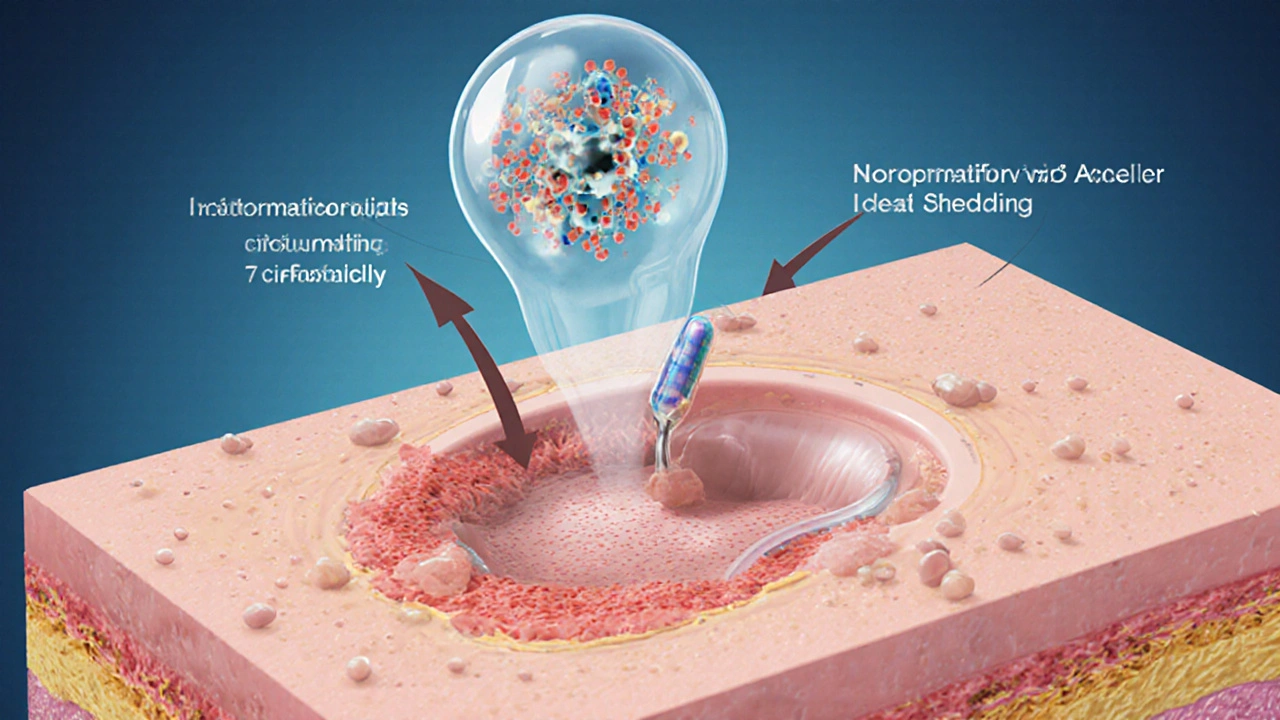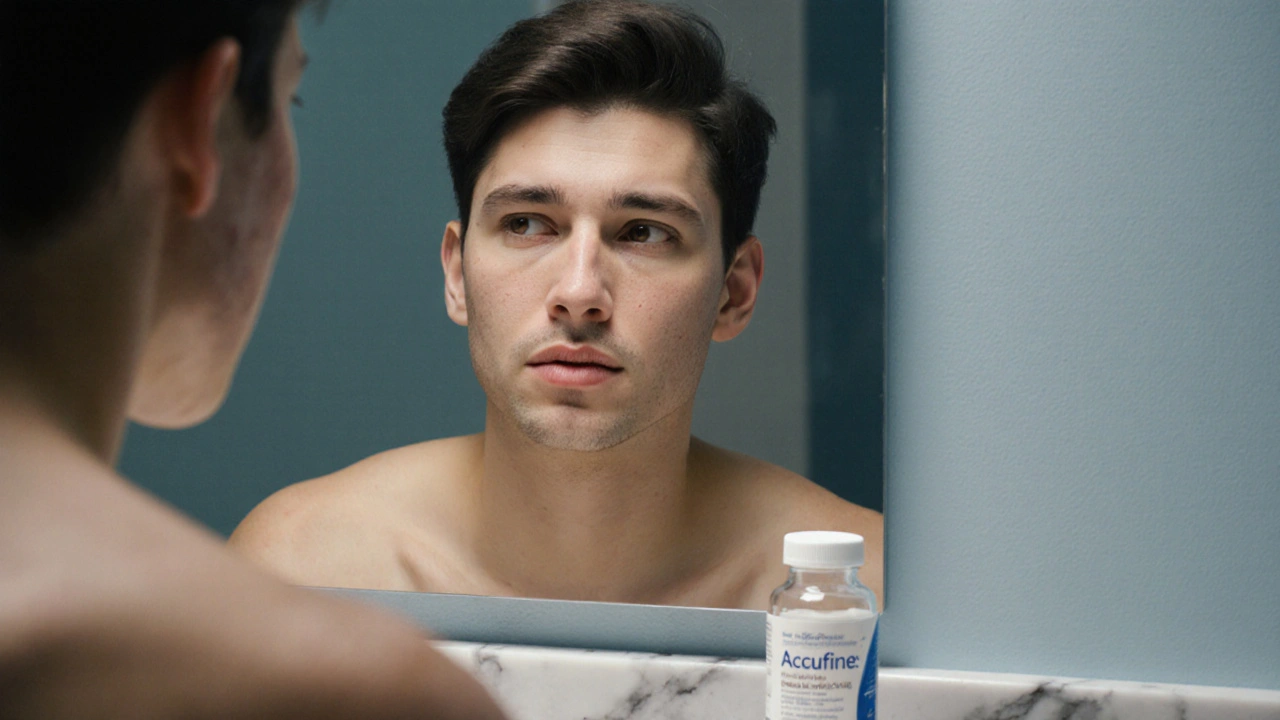Accufine vs. Acne Treatment Decision Guide
Please fill out the form and click "Evaluate Treatment Options" to get personalized recommendations.
- Severe acne often requires stronger treatments
- Pregnancy contraindicates isotretinoin use
- Liver concerns may limit oral antibiotic use
- Fast results are possible with Accufine
- Cost varies significantly between treatments
Always consult with a dermatologist before starting any acne treatment. This tool provides general guidance only.
When severe acne refuses to clear up, many turn to Accufine, a brand of isotretinoin. This oral retinoid promises to shrink oil glands, reduce inflammation, and unclog pores, often delivering results that topical creams can’t match. Yet the drug carries a reputation for serious side effects, prompting patients and doctors to weigh it against a roster of other options. Below you’ll find a side‑by‑side look at Accufine and the most common alternatives, so you can decide which route fits your skin, lifestyle, and health goals.
Many patients ask if Accufine is the right choice for them. The answer depends on severity, tolerance for potential risks, and how quickly you want visible improvement.
How Accufine Works
Accufine’s active ingredient, isotretinoin, is a synthetic form of vitamin A. It works by:
- Reducing the size and output of sebaceous (oil) glands.
- Normalizing the shedding of skin cells inside hair follicles.
- Suppressing the bacteria Propionibacterium acnes through a less oily environment.
The combined effect is a dramatic drop in acne lesions, often after just a few months of treatment. Because it targets the root causes rather than surface symptoms, doctors usually prescribe it for nodular or cystic acne that hasn’t responded to other therapies.
Key Benefits and Common Side Effects
Benefits that make Accufine a go‑to for severe cases include:
- Long‑lasting clearance - many users stay acne‑free for years after a single course.
- Reduction in scarring potential, since fewer active lesions mean fewer injuries to skin.
- Improved skin texture and reduced oiliness.
However, the drug’s potency brings a predictable set of side effects:
- Dry skin, lips, and eyes - often severe enough to require moisturizers and eye drops.
- Elevated liver enzymes and lipid levels - doctors typically run baseline blood tests and monitor monthly.
- Potential mood changes - rare but serious, requiring close psychiatric monitoring.
- Teratogenic risk - absolutely contraindicated in pregnancy; strict contraception is mandatory.
Because of these risks, Accufine is usually a last‑resort option after other treatments have failed.

Top Alternatives to Accufine
Below is a snapshot of the most frequently suggested alternatives, ranging from other oral retinoids to topical agents and hormonal options.
| Drug / Treatment | Form | Typical Dose / Regimen | Regulatory Status | Common Side Effects | Best Suited For |
|---|---|---|---|---|---|
| Accufine (Isotretinoin) | Oral capsule | 0.5‑1mg/kg daily for 4‑6months | Prescription‑only, FDA‑approved | Dryness, liver‑enzyme rise, mood changes | Severe nodular or cystic acne |
| Doxycycline | Oral tablet | 50‑100mg twice daily for 3‑6months | Prescription‑only, widely used | Photosensitivity, gut upset | Inflammatory acne, especially in teens |
| Tretinoin (topical) | Cream / gel | Apply nightly, 0.025‑0.1% concentration | Prescription, over‑the‑counter in low% | Irritation, peeling | Mild‑to‑moderate comedonal acne |
| Benzoyl Peroxide | Gel / wash | Apply 2‑3times daily, 2.5‑10% concentration | OTC | Dryness, bleaching of fabrics | Early‑stage inflammatory acne |
| Spironolactone | Oral tablet | 50‑100mg daily | Prescription, off‑label for acne | Increased urination, menstrual changes | Hormonal acne in adult women |
| Laser / Light Therapy | In‑office procedure | Series of 4‑6 sessions over 3‑6months | Medical device, clinician‑administered | Temporary redness, mild swelling | Patients seeking non‑drug options |
When to Choose Accufine vs. an Alternative
Think of the decision as a balance sheet: severity on one side, risk tolerance on the other.
- Severity: If you have deep cysts, nodules, or extensive scarring risk, Accufine often delivers the fastest, most lasting remission.
- Pregnancy plans: Any potential for pregnancy rules out isotretinoin. Hormonal therapy or topical retinoids become safer bets.
- Liver health: Elevated liver enzymes or cholesterol issues make doxycycline or topical options more attractive.
- Speed of results: Accufine can clear most lesions within 3‑4months, whereas antibiotics or topicals may need 6‑12months.
- Budget & access: Isotretinoin courses cost more upfront and require frequent lab work. OTC benzoyl peroxide or generic topical retinoids are cheap and easy to obtain.
In practice, dermatologists often start with a “step‑up” approach: begin with topical benzoyl peroxide or a retinoid, add oral antibiotics if needed, and consider Accufine only if those steps fail.
Decision Checklist - Is Accufine Right for You?
- Do you have severe nodular or cystic acne that has persisted >12months despite other treatments?
- Are you willing to undergo monthly blood tests for liver function and lipid panels?
- Can you commit to strict pregnancy prevention (effective contraception) for at least one month before, during, and one month after treatment?
- Do you have a history of depression or severe mood disorders that might be aggravated by isotretinoin?
- Is your dermatologist experienced with isotretinoin dosing and monitoring?
If you answered “yes” to most of these, Accufine could be the most efficient route. If you hesitated on any point, explore the alternatives listed above.
Practical Tips for Managing Accufine Therapy
- Start with a low dose (0.25‑0.5mg/kg) to gauge tolerance, then increase gradually.
- Invest in a high‑quality lip balm and fragrance‑free moisturizer - dry skin is the most common complaint.
- Schedule blood work at baseline, then every 4‑6weeks. Keep a log of results to discuss with your doctor.
- Avoid vitamin A supplements, retinol creams, and excessive sun exposure while on the drug.
- Use non‑comedogenic sunscreen daily; isotretinoin makes skin more photosensitive.
FAQs
How long does an Accufine course last?
Typical courses run 4‑6months, aiming for a cumulative dose of 120‑150mg/kg. Some patients may need a second round after a break of several months.
Can I combine Accufine with topical treatments?
Yes, gentle moisturizers and non‑retinoid sunscreens are safe. Strong retinoids or exfoliating acids should be paused to avoid excessive irritation.
What should I do if I notice mood changes while on Accufine?
Report any signs of depression, anxiety, or suicidal thoughts to your dermatologist immediately. Some clinicians stop the medication and refer you to a mental‑health professional.
Is Accufine safe for teenagers?
It can be prescribed for adolescents, but the same strict monitoring applies. Many physicians prefer to start with topical retinoids or oral antibiotics before moving to isotretinoin.
How do I know if an alternative like doxycycline is enough for me?
If your lesions are primarily inflammatory (red, swollen) and you haven’t tried antibiotics before, a 3‑month doxycycline course often clears most breakouts. Evaluate after 8‑12weeks; if improvement stalls, discuss next steps with your dermatologist.
Choosing an acne therapy isn’t a one‑size‑fits‑all decision. By weighing severity, health background, and lifestyle, you can decide whether Accufine’s powerful results outweigh its risks, or if a gentler alternative better matches your needs.
